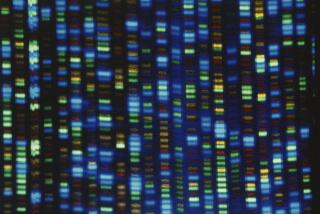Soviets to Let UCLA Doctor Study 100,000 A-Victims : Lifelong Monitoring Planned
- Share via
MOSCOW — UCLA bone marrow specialist Dr. Robert Gale said today that he has signed a long-term agreement with Soviet health experts to monitor, for the rest of their lives, roughly 100,000 people in danger of contracting cancer from the Chernobyl nuclear accident.
Gale, who has performed bone marrow transplants on some Chernobyl victims, said the accord is aimed at studying the ultimate consequences of the April 26 accident, the world’s worst, among the people evacuated from the 19-mile zone around the reactor.
The official death toll in the accident stands at 26, and Gale said the figure “will probably not change by greater than 10%” among the 80 survivors who suffered serious radiation exposure.
Gale was speaking at a news conference a day after returning from the Ukraine, where he consulted health officials and flew by helicopter over the stricken nuclear reactor.
Abandoned Town
He said the only movement he saw in the once-thriving plant town of Pripyat was laundry flapping in the breeze. Pripyat was abandoned by its 25,000 residents nearly six weeks ago.
The major objective of the study, Gale said, will be to “carefully follow cancer incidences in the Ukraine and surrounding area for a definite period,” particularly among about 100,000 people felt to be at highest risk.
“This will require the talent and expertise of large numbers of scientists and physicians,” he added.
Gale predicted that the number of people who contract leukemia and thyroid cancers will be “rather small” and noted that the diseases will develop over some years, making it difficult to link the cases directly to the Chernobyl accident.
Kiev Pregnancies
He said he and Dr. Andrei Vorobyev, a Soviet blood specialist who appeared at the news conference with him, had signed a preliminary agreement to do the studies.
Gale was asked about rumors circulating in Moscow that many pregnant women in Kiev who fear they may have been exposed to radiation have been applying for abortions.
He said Ukrainian officials told him that a commission has studied the question but that no uniform recommendation has been made. Gale said he understood that obstetricians will agree with individual women whether to perform abortions.
The explosion and fire at the nuclear power plant spewed a huge cloud of radiation that spread over Europe. Journalists asked Gale what the health consequences may be for European countries.
‘Remain Calm’
“It would be a mistake to try to come up with numbers concerning Western Europe or even the rest of the Soviet Union,” he said. “The projections we can make are extremely imprecise. I would urge everyone to remain calm and not make alarming statements.”
The American specialist, who has helped treat those most severely injured in the accident, noted that 1,000 to 2,000 people were screened for radiation exposure soon after the accident at the plant 80 miles north of Kiev.
“Most were judged not to be at risk, but 400 to 500 were admitted to hospitals,” he said. “Some are being followed as outpatients.”
More to Read
Sign up for Essential California
The most important California stories and recommendations in your inbox every morning.
You may occasionally receive promotional content from the Los Angeles Times.










